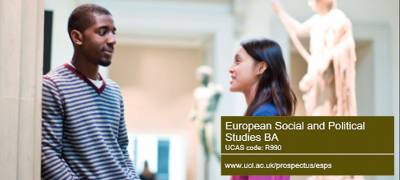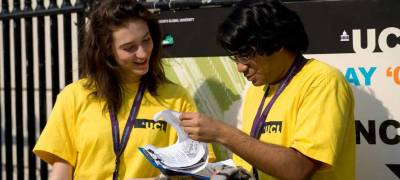The year abroad is spent in a country where the student's (major) European language is spoken and in a university which offers courses relating to the student's humanities or social science specialism. Students taking two major languages will divide the year between two countries where their languages are spoken. The year abroad cannot be spent in a country where the minor language is spoken.
Research on a dissertation topic derived from the field of your specialisation is carried out during the year abroad, utilising foreign sources.
Students return with an added maturity which proves a key attraction in the job market, and transferable skills in the form of independence, capacity to communicate and intercultural experience.
- Boost fluency and confidence
- Become immersed in a different culture and society
- Develop new interests and aptitudes
- Make valuable contacts
Established placements
ESPS has established placements in leading institutions in continental Europe including:
- Paris: Institut d'Etudes Politiques de Paris (Sciences Po)
- Bordeaux: Institut d'Etudes Politiques de Bordeaux (Sciences Po Bordeaux)
- Brussels: Universite Libre de Bruxelles
- Madrid: Universidad Autónoma de Madrid
- Seville: Universidad de Sevilla and Universidad Pablo de Olavide
- Milan: Università degli Studi di Milano
- Rome: Universita di Roma La Sapienza
- Berlin: Humboldt Universität and Freie Universität
- Hamburg: Universität Hamburg
Erasmus placements
ESPS students are also eligible to apply for Erasmus placements at a range of European universities including:
- Université Sorbonne Paris IV
- Université Lumière Lyon II
- Universität Wien in Vienna
- Università degli Studi di Firenze in Florence
- Università degli Studi di Bologna
- Università degli Studi di Napoli L'Orientale in Naples
- Universidad de València
- Universidad de Granada
- Universidad Pompeu Fabra (Barcelona)
- Universiteit van Amsterdam
- Destinations in Scandinavian countries
Unfunded exchanges are available for students taking Russian as their major language. These include St Petersburg State University and Moscow State Institute of International Relations (MGIMO).
UK HEIs will not be eligible to apply for future Erasmus+ funding projects, and therefore the way in which students exchange in Europe will change. Funding is however secure for the remainder of the 2020/21 and for the full 2021/22 AYs. The UK government have confirmed that it is setting up a replacement scheme, named after the code breaker and mathematician Alan Turing. The Turing Scheme will:
- Begin in September 2021
- Provide £100 million funding to UK educational institutions
- Provide funding for both European and non-European mobility
- Support study placements abroad
Further details of the scheme will be published as soon as these are available.
Students/Applicants should be aware that being offered a place on the BA ESPS does not guarantee the provision of a study abroad placement. Participation in the Study Abroad programme is conditional on the outcome of your progression into the third academic year, approval by your placement department, Faculty, UCL Student Support and Wellbeing and the Study Abroad Team.
Following the offer of a study abroad placement, admission to your allocated host university is confirmed by that university and is subject to completion of a formal application to them. Our partners do reserve the right to reject candidates if they have not completed the formal application or do not consider the candidate to meet their academic or language requirements (if not teaching in English). Placements at our partner institutions are negotiated on an annual basis and are therefore subject to change or withdrawal without prior notice.
 Close
Close



